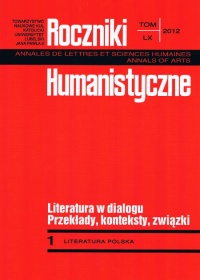An Unknown 17th Century Polish Translation of De Constantia by Justus Lipsius – aPreliminary Analysis
Abstract
This paper is devoted to the Polish translation of the 16th-century work by Justus Lipsius, entitled De Constantia. The translation was made by the Voivod of Vitebsk Andrzej Kazimierz Kryszpin-Kirszensztein in 1698. When studying Kryszpin's documents in the 18th century, Gedeon Jeleński found a manuscript entitled Stateczność umysłu albo Nauka polityczna o statecznej cierpliwości podczas złych czasów [Constancy of the mind or a political lesson in balanced patience during unfavourable times]. As there were no other hints or indications concerning the authorship of the text, it was credited to Kryszpin. Thus, mistakenly recognized as the original, the work was published by Franciszek Bohomolec in 1769. The author of the paper analyses the principles that Kirsztensztein adopted in the introduction to the manuscript, where he presented how difficult it was to write the text and where he argued that writing it was possible owing to his vast expertise in Antique literature. The techniques that Kryszpin used to keep under cover the relationship between his work and its Latin source are discussed, as are the strategies of how Kryszpin deluded the reader into thinking that his thought was original. The paper ends with an appendix containing Kryszpin's foreword to the reader. This text unveils Kryszpin's clear intention to have the text published. The paper also discusses a selection of remarks on Kryszpin's attitude towards the source text. The preliminary analysis ventured by the author seems to indicate that Kryszpin-Kirszensztein's work is a paraphrase, a vast summary, and a descriptive analysis of Lispius's work and that the two works stay in a relatively loose aesthetic and compositional connection. The closest bond between the two texts obtains on the level of main ideas and thoughts.
Copyright (c) 2012 Roczniki Humanistyczne

This work is licensed under a Creative Commons Attribution-NonCommercial-NoDerivatives 4.0 International License.





